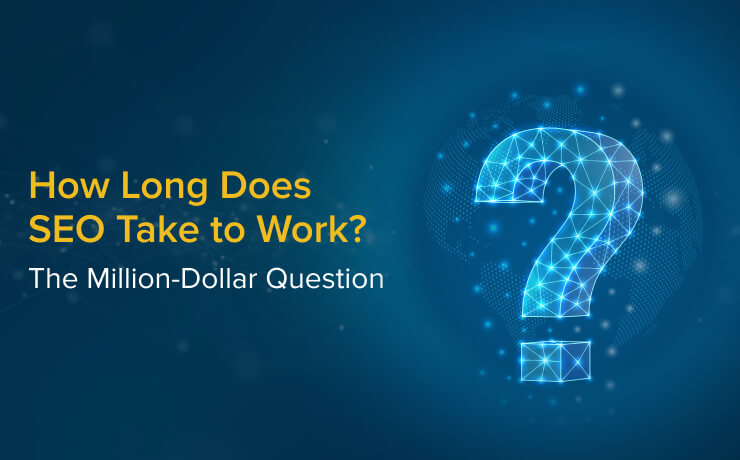
If you’ve ever started a diet and checked the mirror the next day hoping for that magic transformation, you understand the anticipation that comes with SEO. In my 14 years as a digital marketing strategist, I’ve had plenty of clients ask, “So… how long does SEO take to work?” It’s the SEO equivalent of asking a chef, “Is dinner ready yet?”—when they’ve just turned on the stove.
If you’re considering investing in organic SEO, you’re probably hoping for a noticeable payoff, preferably sooner rather than later. Let’s find out why SEO isn’t a “two-minute miracle” and what you can expect along the way.
Why SEO Takes Time (and Why That’s a Good Thing)
Picture SEO like planting a tree: you prepare the soil (your website structure); plant the seed (your keywords); water it (consistent, relevant content); and wait for it to grow. Sure, there are ways to make it grow faster, but ultimately, you need time, patience, and a touch of finesse.
Here’s why SEO doesn’t work overnight:
- Search Engines Love Consistency
Search engines like Google aren’t fans of flash-in-the-pan sites—they want to see steady, quality content over time. Think of it as dating; you must build trust, which only happens with consistency. They’ll start by noticing your site and, if they like what they see over time, reward it with better rankings. - Building Domain Authority is Like Climbing a Ladder
Imagine your website as the new kid on the block. To gain trust, you need to show up with quality content, reliable backlinks, and solid site health. Rome wasn’t built in a day, and neither is a top-ranking website. Search engines want to see steady progress, quality content, and authority-building to validate your site as a trusted resource. - Quality Over Quantity (or Why SEO Success isn’t just about Volume)
SEO success isn’t a numbers game; it’s about providing valuable content that’s actually helpful to your audience. Stuffing keywords, spinning thin content, or buying links might give a temporary boost but eventually lead to a drop. When you focus on quality, you build a sustainable SEO presence that withstands the occasional Google algorithm tweak.
Breaking Down the SEO Timeline
Now that we understand why SEO takes time, let’s map out a realistic timeline of what to expect in your SEO journey:
Month 1 – Keyword Research & Site Structure
The first month is where the groundwork happens, behind the scenes. We’re deep-diving into your industry, identifying keywords, planning your site’s directory structure, and setting up essential technical SEO tools like Google Analytics and Search Console. By the end of month one, you probably won’t see any fireworks just yet. Think of it as putting on the right shoes before a marathon—you’re getting ready, but the real race hasn’t started.
Typical Tasks in Month 1:
- Conducting keyword research to find relevant search terms.
- Planning site structure for optimal navigation and ease of use.
- Setting up technical SEO basics, including performance-tracking tools.
Months 2-3 – Content Creation and Technical SEO Improvements
Now that your site’s foundation is set, we start creating content around your target keywords and refining your website’s technical performance. From crafting valuable blog posts to enhancing metadata and improving site speed, these months are all about building a solid content and technical SEO strategy.
By the end of month three, you might see early signs of SEO traction, like modest keyword ranking improvements. Keep in mind that real results are still on the horizon. In SEO, patience isn’t just a virtue—it’s a requirement!
Typical Tasks in Months 2-3:
- Content creation for core pages and blog posts., The focus is on value and relevance.
- Implementing on-page SEO (e.g., meta titles, descriptions, and header tags).
- Improving site speed and mobile responsiveness.
Months 4-6 – Building Links and Tracking Metrics
At this point, your content is live, your site is optimized, and Google’s starting to take notice. This phase is all about building backlinks, which are like “upvotes” from other websites that signal your site’s authority. Backlinks are important for building domain authority, which in turn improves rankings. This is also when we start monitoring and fine-tuning your keyword performance and analyzing traffic.
By the end of month six, you should start to see keyword rankings moving up and perhaps even a steady trickle of organic traffic.
Typical Tasks in Months 4-6:
- Backlink outreach to reputable sites in your niche.
- Tracking keyword rankings and adjusting as necessary.
- Analyzing site metrics to spot opportunities and challenges.
Months 6-12 – Growth and Continued Optimization
This is the sweet spot! where you really start to see results. At this stage, you’ll likely notice measurable gains in organic traffic, keyword rankings, and even conversions. With a strong foundation and consistent content, SEO results often snowball around this time, producing steady growth.
Expect to see more competitive keywords begin to rank, and increased engagement from organic traffic.
Typical Tasks in Months 6-12:
- Refining content for high-performing keywords.
- Optimizing based on analytics insights.
- Building more quality backlinks and monitoring site health.
Factors Influencing How Long SEO Takes
While the above timeline is a good general guide, every website is unique, and SEO timelines can be influenced by various factors. Here are some of the main ones:
- Industry Competition
If you’re in a highly competitive industry, expect a longer journey to the top. Ranking for high-value keywords in crowded sectors (think finance, health, or real estate) is challenging and requires robust strategies and resources. - Quality and Frequency of Content
Not all content is created equal. Regular, insightful content (rather than thin or “keyword-stuffed” pieces) will drive engagement, reduce bounce rates, and ultimately help rankings. Aim for quality; don’t be afraid to publish consistently. - Technical Health of Your Website
Site speed, mobile friendliness, and overall technical SEO health are foundational to SEO success. A slow or glitchy site will hurt your rankings, no matter how great your content is. - Domain Authority
Your site’s authority plays a big role in SEO timelines. Established sites with a solid backlink profile will see faster SEO results compared to brand-new domains. - The Right SEO Strategy
Some SEO strategies focus on “low-hanging fruit,” while others target long-term, competitive goals. If your SEO agency or strategist is focused on quick wins without a long-term plan, results may be quick but unsustainable.
Pro Tips for Speeding Up SEO Results
Though you can’t skip the line in SEO, there are ways to fast-track progress responsibly. Here are a few tricks to make the most of your SEO investment:
- Optimize for “Quick Win” Keywords: Focus on less-competitive keywords early on, which can yield quicker results and build momentum.
- Leverage Content Repurposing: Create different formats of your content (like videos, infographics, or podcasts) to maximize engagement and attract different types of backlinks.
- Focus on Local SEO: For businesses serving specific geographic areas, local SEO can yield faster results through location-specific keywords and backlinks.
- Integrate AI Tools: AI tools can help with keyword research, content suggestions, and trend monitoring., This allows you to be more strategic and efficient in your approach.
Measuring SEO Progress: How to Know You’re on the Right Track
Patience is key, but how can you tell if you’re making progress? Here’s what to track to measure your SEO success over time:
- Keyword Rankings
Keyword rankings are one of the earliest indicators of SEO progress. Keep an eye on primary keywords and gradually work your way up to more competitive terms. - Organic Traffic Growth
Organic traffic is the holy grail of SEO. Over time, as you rank for more keywords, you should see a steady increase in the number of visitors from search engines. - Content Indexing Milestones
Google and other search engines need to index your pages before they can rank. Monitor which pages are being indexed and how frequently new content gets indexed. - Click-Through Rates (CTR)
A high CTR indicates that your content is relevant and compelling. You can increase CTR by crafting catchy meta titles and descriptions. - Conversion Rates and Leads Generated
Ultimately, the goal of SEO isn’t just traffic but qualified traffic. Tracking leads, conversions, and other key performance indicators will give you a better idea of how effective your SEO campaign is.
The Bottom Line on SEO Timelines
SEO might not work overnight, but the long-term benefits make it worth the wait. With the right strategy, quality content, and a little patience, SEO can be one of the most powerful tools to grow your business online. Stick with it, trust the process, and don’t forget to celebrate those milestones along the way. When the results start rolling in, you’ll see why the wait was well worth it!
-
 Free
Consultation
Free
Consultation
-
 Free
Google Ads Audit
Free
Google Ads Audit








